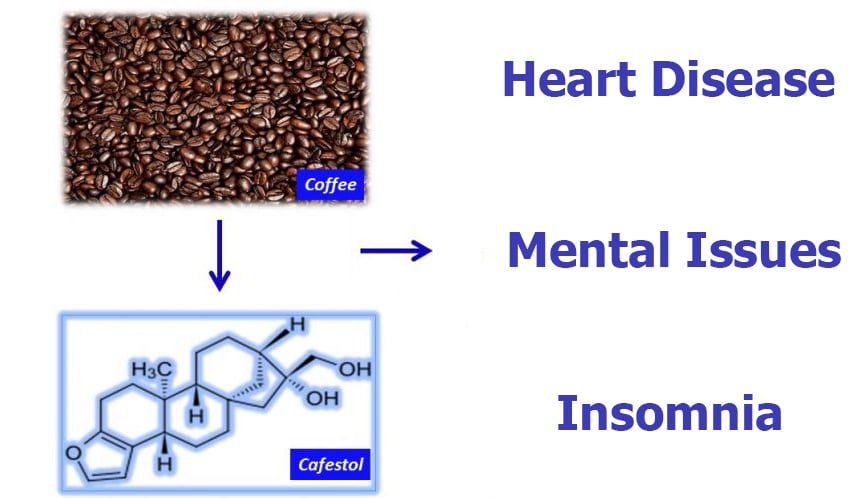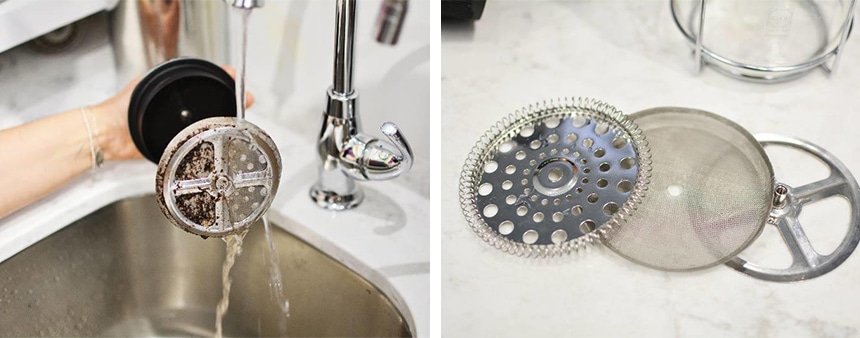

Is French Press Coffee bad for you? It seems that the French Press has been getting some bad press lately because its metal filter does not remove the substance cafestol from the brew. According to a study in Science News Trusted Source How Coffee Raises Cholesterol -- ScienceDaily Drinking your coffee black or decaffeinated to keep cholesterol in check? Think again. www.sciencedaily.com , cafestol elevates cholesterol by “hijacking a receptor in an intestinal pathway critical to its regulation.” In fact, drinking five cups of French press coffee per day (the equivalent of 30 mg of cafestol) was found to raise cholesterol in the blood by 8% or more. Yet another issue with French Presses is that if you let the grounds sit in the plunger and filter parts, they will grow mold and bacteria that can make you very sick. However, any coffee brewing process with a paper filter will remove this substance, and cleaning your French Press properly after every use prevents poisoning.

A French press is a glass cylinder with a lid that has a plunger attached. Coffee beans are macerated to a medium grind and deposited at the bottom of the cylinder. Boiling water is poured on the grounds and left to sit so that the coffee can be brewed. The plunger has a metal mesh bottom that can be pressed down on the grounds, extracting the flavor so that only the brewed liquid sits on top of the plunger. The trickiest part of all of this is not letting any of the grounds get past your plunger rim inside the glass. You can then pour the coffee into your cup.
The big issue with the French Press is the lack of a paper filter. Paper filters are not sold for French Presses, but you can make one out of a regular small filter by cutting it to the size of the circular head of your plunger. Its easily done by tracing the plunger size and then cutting out a circle. You can then fit this homemade filter between the mesh parts of the plunger, poking a hole through the filter and then placing it on the metal mesh and replacing the screw. You could also use paper towels, but it is recommended that you avoid this as some paper towel brands contain formaldehyde.
Another coffee brewing process that does not use paper is the Moka Pot, and like the French Press, could put you at risk for drinking cafestol, thus causing “bad cholesterol” and other issues. The Moka Pot works by pumping hot steam up from a bottom metal chamber filled with coffee grounds through a narrow pipe with two spouts to a top chamber that holds the brewed coffee.
Aside from having no paper filter, the major danger of using a Moka Pot is that many are made of aluminum that dispenses trace elements during the brewing process. According to an article in Neuroscience News and Research Trusted Source Aluminum Exposure Again Linked to Alzheimer's Disease | Technology Networks A new study supports a growing body of research that links human exposure to aluminum with Alzheimer’s disease (AD). Researchers found significant amounts of aluminum content in brain tissue from donors with familial AD. www.technologynetworks.com , aluminum cookware is suspected of causing Alzheimer’s disease. The price of a Moka Pot is certainly right if you are on a budget, at around $30.00. However, if you can’t afford an expensive espresso machine and don’t like how cold coffee gets when made with a French Press, then you might want to consider buying a Moka Pot.

Here are some ways that drinking coffee made in a French Press might cause heart disease, mental issues, and insomnia.
Any substance that raises your cholesterol will cause heart disease. According to an article in Healthline, cafestol is the most potent cholesterol-elevating compound Trusted Source Coffee and Cholesterol: Is There a Link? Coffee may raise cholesterol, but this depends on how you brew it and how much you drink. Read on to learn more. www.healthline.com found in the human diet. Drinking two or more cups of coffee made in a French Press or Moka Pot a day might significantly raise your risk of stroke or heart attack.
According to discoveries made in a clinical trial Trusted Source Diterpenes from coffee beans decrease serum levels of lipoprotein(a) in humans: results from four randomised controlled trials - PubMed Coffee diterpenes are among the few dietary exceptions shown to influence serum lipoprotein(a) levels. However, the Lp(a)-reducing potency of coffee diterpenes may subside in the long run, and their adverse side effects preclude their use as lipoprotein(a)-reducing agents. pubmed.ncbi.nlm.nih.gov , cafestol is technically a diterpene that can cause non-alcoholic fatty liver disease, which can cause nausea, edema weakness, abdominal fullness weakness, and extreme tiredness or mental confusion. Yet another issue with coffee, in general, is that it is very addictive, and it’s possible to become quite dependent on it. Withdrawal from coffee can cause muscle fatigue, mental fogginess, and other issues.
Most people are aware that drinking too much coffee, especially later in the day, can cause insomnia. You may be thinking that switching to decaffeinated coffee will reduce the levels of cafestol in French Press brewed coffee, but unless there is a homemade paper filter in it, all that is reduced is the caffeine, and you will still experience the negative effects of cafestol.
The more predisposed you are towards heart disease, the more likely you are going to suffer an effect from the cafestol in coffee. It’s best to avoid this method of brewing your beans if you have any trouble sleeping through the night.
Although consuming cafestol might cause health issues, one study published in McGraw Hill Access Science found that it also demonstrated some protective effects against the development of type 2 diabetes.
Drinking expired coffee can be unpleasant, but it won’t make you sick. If you are going to use a French Press to brew your coffee, then make sure you choose a good grinder and bean. You can check our review of the best coffee grinders for French press to find the one you’ll be satisfied with. As for the coffee beans, a great choice is Gran Riserva Filtro, which is a whole dark roasted blend that you can grind yourself with hints of cocoa and caramel.

Drinking just one cup of French Press coffee instead of a couple a day would likely help protect you from elevated cholesterol levels, as would fashioning the homemade filter. Avoid drinking metal filtered coffee while smoking, as that is another high-risk activity that causes heart disease.
Another risk to your health is bacteria collecting inside the wire mesh filter and other French Press parts. Often the used coffee grounds gather in hidden places and, if left overnight for the next brew, can make some people very sick. Thankfully you can sanitize the entire French Press by completely separating and washing each part with hot soapy water.
Just simply stay away from Moka Pots and French Presses with aluminum parts as they are more likely to deposit the heavy metal into your body and contribute to issues such as Alzheimer’s disease
Now that you know why French Press coffee is bad for you, you can take the measures needed to protect your health from threats such as cafestol and bacteria. To avoid the negative health consequences of consuming cafestol in your coffee, avoid using a French Press or Moki pot and consider investing in a coffee maker that uses paper filters. You can also make your own paper filters by cutting them to fit from regular paper coffee filters and inserting them as a barrier between the mesh and top of the filter in your actual French Press plunger. You can also protect your health by simply reducing your French Press brewed coffee consumption to a cup a day. Yet another key to safely using a French Press is to take them apart every day if possible and thoroughly clean it as they are notorious for collecting bacteria.





